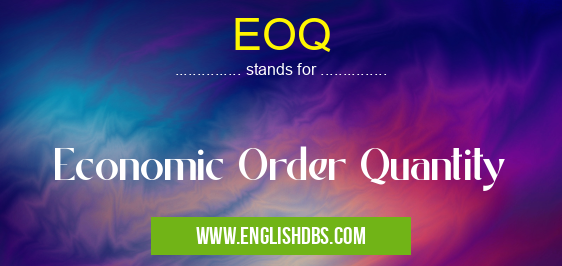What does EOQ mean in MILITARY
EOQ stands for Economic Order Quantity and is a key concept in governmental inventory management. It is the optimal amount of goods that should be ordered at one time to minimize the total costs of ordering and holding inventory. The EOQ model attempts to identify when it will be most cost-efficient for a company or government agency to order more goods from suppliers. By finding the minimum quantity of items that can be reordered at any given time, this model provides an effective way for governments to manage their budgets while still meeting the needs of their population.

EOQ meaning in Military in Governmental
EOQ mostly used in an acronym Military in Category Governmental that means Economic Order Quantity
Shorthand: EOQ,
Full Form: Economic Order Quantity
For more information of "Economic Order Quantity", see the section below.
» Governmental » Military
How does EOQ work? EOQ models rely on three standard assumptions
1) Demand for products remains constant over time; 2) Lead times (the amount of time required between ordering and delivery) stay constant; 3) Each order placed has a fixed cost associated with it (shipping, packaging, etc.). Based on these assumptions, calculations are made regarding how frequently orders need to be placed in order to maintain a desired level of stock without incurring excessive storage costs or delaying delivery times too often due to insufficient stock levels. This calculation leads governments towards an optimal order quantity that allows them to respond quickly while keeping costs low.
Essential Questions and Answers on Economic Order Quantity in "GOVERNMENTAL»MILITARY"
What is Economic Order Quantity (EOQ)?
EOQ is a technique used to determine the most cost-effective way to buy and store inventory. It helps to minimize both the purchase order costs and holding costs of purchasing and storing items. By determining the best amount to purchase at any given time, businesses can reduce costs while ensuring that they always have sufficient stock on hand.
Who uses EOQ?
EOQs are generally used by businesses which rely on inventory in order to keep operations running smoothly. This includes companies in manufacturing, retail, hospitality, warehousing, or other industries which deal with physical goods in significant quantities.
What are the benefits of using an EOQ Model?
An EOQ Model helps identify the point of balance between ordering too much inventory or not enough inventory. It assists in optimizing the overall inventory management strategy by helping determine when to reorder, what quantity should be ordered, and how much safety stock should be kept on hand as a buffer for unexpected demand spikes. Additionally, it helps businesses save money by reducing carrying costs associated with excess storage fees and late delivery penalties due to understocking.
What factors influence EOQ calculations?
The main components that influence an organization’s EOQ calculation include demand for inventory, purchase cycle time, cost per unit of each item being ordered, carrying cost associated with storing each item, annual cost of ordering each item from suppliers and any existing discounts from bulk purchases.
How often should I calculate my company's EOQ?
It is recommended that you regularly review your orders and recalculate your optimal order quantity at least once every quarter or whenever there is a change in market dynamics or supplier policies that may affect your demand forecasts or pricing structures.
How do I calculate my company's EOQ?
To calculate your company's Economic Order Quantity (EOQ), you will need access to data such as expected demand for products per year; lead time/delivery time needed between ordering products; purchase price per unit; holding costs/storage fees incurred per year; annual cost of placing orders; and any additional discounts offered upon bulk purchases. Once all relevant information has been inputted into the equation provided below (EOQ =√(2DS/H)), you can calculate your optimal economic order quantity for each product you carry in just minutes!
What happens if my actual demand doesn't match my forecasted demand when calculating EOq?
In this case, it is important to adjust your forecasted demand figure accordingly before making decisions based off of your calculated Economic Order Quantity value. If actual demand surpasses the expectations indicated within the equation parameters then more frequent reordering combined with increased safety stock levels may be necessary to meet customer demands while also reducing related risks such as backorders or out-of-stocks due to insufficient supply levels.
Does my company have any legal obligations regarding our minimum placeable order size when using an EOq model?
Many suppliers require customers adhere to their declared minimum order size thresholds regardless if calculated through an Economic Order Quantity model or not - so check with each business partner independently prior to submitting orders based off assumed parameters determined within an Eoq formula.
Final Words:
In summary, economic order quantity (EOQ) is an important tool for governmental agencies who must manage large inventories while controlling budget expenditures. By using this model, they can more accurately calculate the optimal amount of goods they need to purchase in each instance so as not only ensure customer satisfaction but also limit costs associated with storing excess stock or placing too many small orders too frequently from vendors.
